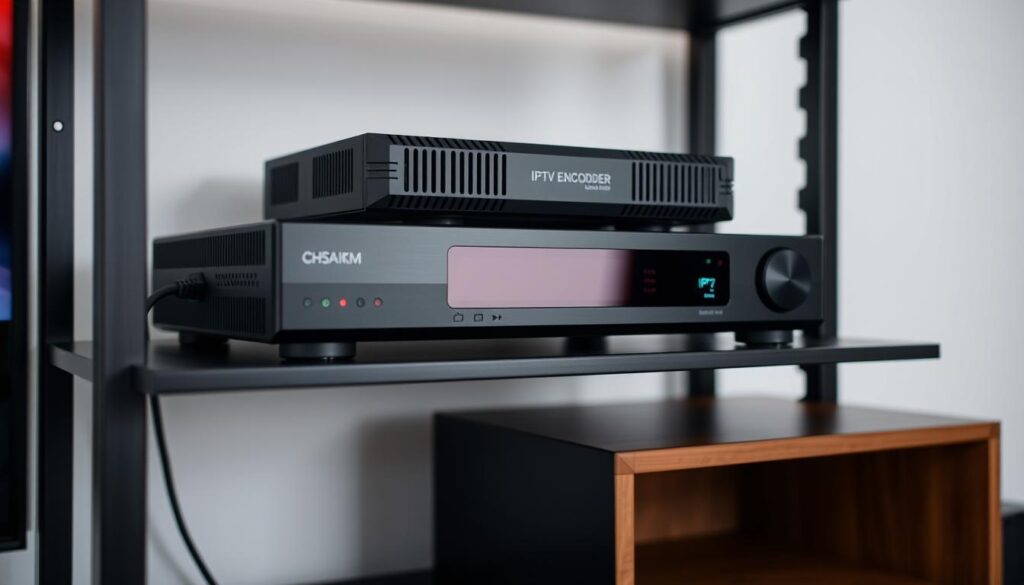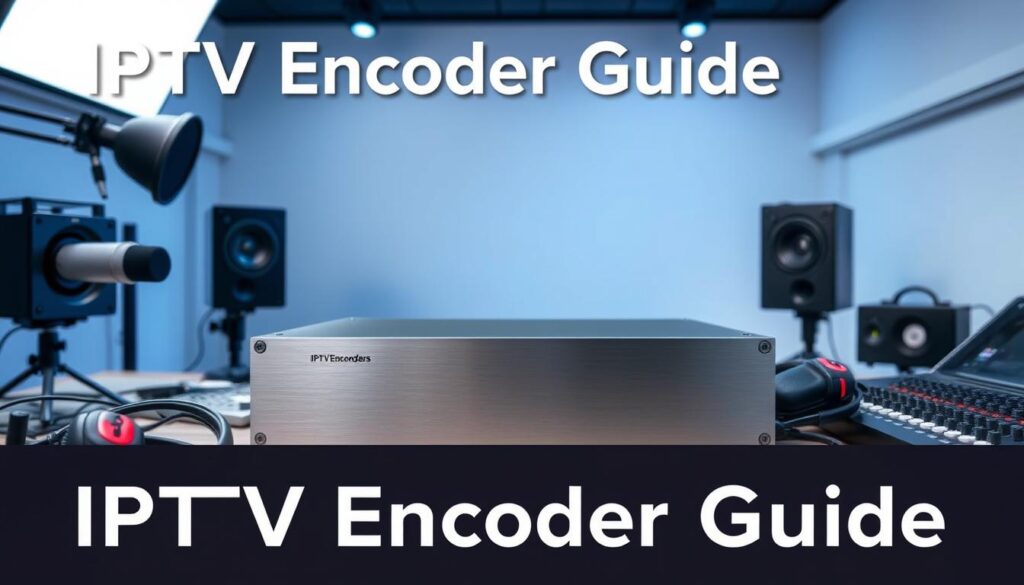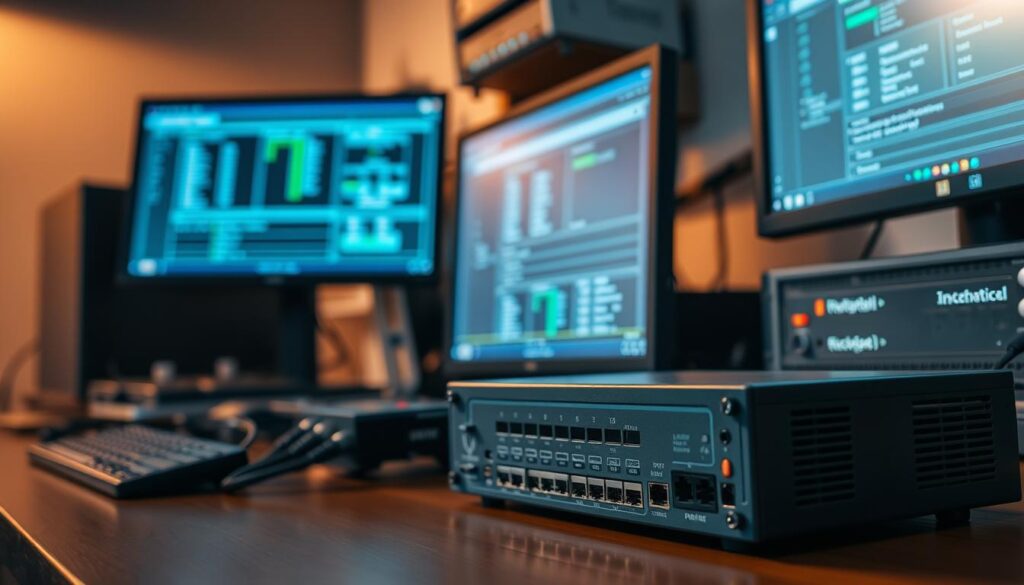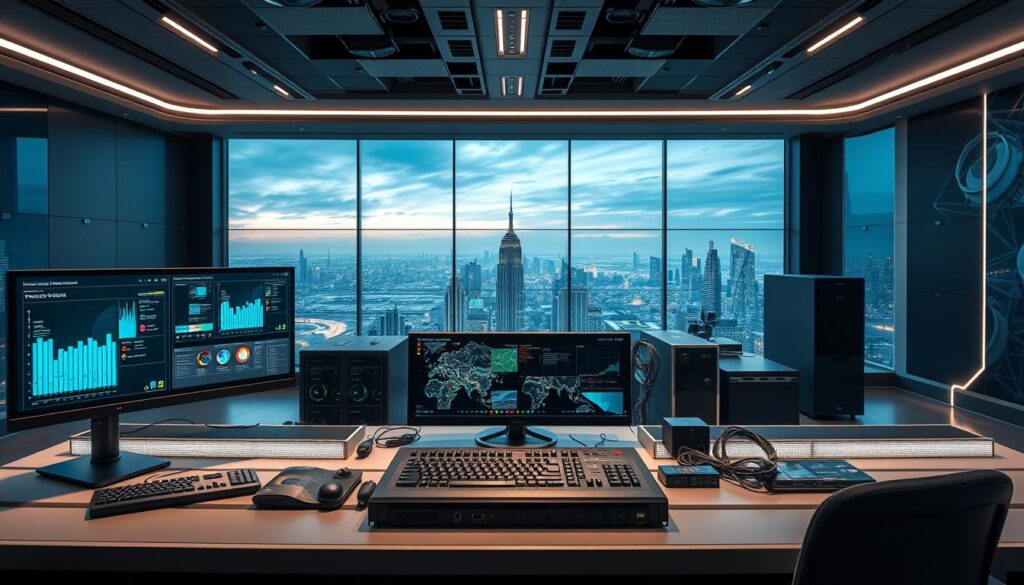I’m excited to share my knowledge on setting up an iptv encoder for smooth streaming. Online streaming has become popular, making traditional cable bills seem expensive and wasteful. Switching to IPTV with TVShackTV.com is a smart move for a cheaper, easier option.
IPTV gives you access to movies, sports, and international channels easily. Say goodbye to unused subscriptions and missed shows!
Streaming is hassle-free with no contracts or hidden fees. Buy your IPTV subscription from TVShackTV.com and enjoy the perks of iptv streaming with a reliable encoder. I’ll show you how to improve your stream quality for a better viewing experience.
This guide will cover the basics of iptv encoding and why choosing the right encoder is key. It will also offer tips to enhance your stream quality. Whether you’re new to streaming or have experience, this guide will elevate your streaming game with the right encoder.
Table of Contents
Understanding IPTV Encoder Basics
To enjoy smooth streaming, knowing about iptv encoding is key. An iptv encoder changes video and audio into digital formats for online streaming. When setting up an iptv encoder, the type and its features matter a lot.
Choosing the right encoder is important for good iptv encoding. There are hardware and software encoders, each with its own benefits. Hardware encoders are often more reliable and efficient. On the other hand, software encoders are more flexible and customizable.
- Video and audio quality
- Bitrate and resolution settings
- Compatibility with different streaming protocols
- Ease of use and configuration
Understanding these basics and key features helps you choose the right encoder. This ensures your streaming is of high quality.
Why You Need an IPTV Encoder for Streaming
For iptv streaming, having a high-quality stream is key. An iptv encoder guide helps you set up your encoder for the best results.
An iptv encoder turns your video into a format that streams well online. Without one, your stream might buffer, lag, or look bad.
Using an iptv encoder offers several benefits:
- Improved stream quality
- Reduced latency
- Increased reliability
With a detailed iptv encoder guide, you can make sure your stream is top-notch. This gives your viewers a great iptv streaming experience.
Choosing the Right IPTV Encoder for Your Needs
Choosing the right IPTV encoder is key for smooth streaming. You need to think about stream quality, latency, and reliability. We’ll look at what to consider when picking an IPTV encoder, including your encoding needs.
There are two main types of encoders: hardware and software. Each has its own advantages and disadvantages. Hardware encoders are reliable and have low latency, great for live streaming. Software encoders are flexible and easy to update but need more power.
Key Considerations for Choosing an Encoder
- Budget: Decide how much you want to spend on an encoder, including any ongoing costs.
- Technical Requirements: Check if the encoder meets your streaming needs, like resolution and bitrate.
- Stream Quality: Think about the quality you need, like latency and video clarity.
By looking at these factors and your encoding needs, you can pick the best IPTV encoder. This ensures your streaming is high-quality and reliable.
My Recommended IPTV Encoder Setup Process
To get the best out of iptv streaming, you need to follow a clear iptv encoder guide. This guide helps you pick the right encoder, set it up, and improve stream quality.
Here are the main steps to take:
- Choose an encoder that fits your needs, looking at video and audio quality, and compatibility.
- Set up the encoder with the right settings, like resolution, bitrate, and frame rate, for the best performance.
- Make your stream better by tweaking settings for buffering, latency, and error correction.
By following these steps and using a good iptv encoder guide, you’ll get a top-notch iptv streaming experience. Always check and update your encoder settings to keep performance high.

Essential Hardware Requirements for IPTV Encoding
Setting up an iptv encoder setup needs the right hardware for smooth streaming. IPTV encoding requires lots of processing power, storage, and network bandwidth. We’ll look at what hardware you need for iptv encoding, like processing power, storage, and network needs.
Choosing the right hardware is key for your iptv encoding setup. You need a processor that can handle iptv encoding well. Also, enough storage for your video content is important. A good network connection is vital for streaming quality video.
Processing Power Needs
A fast processor is vital for iptv encoding. Look for a processor with many cores and threads, and a high clock speed. More cores and a faster clock speed mean faster processing and better performance.
Storage Specifications
You need enough storage for your video content. The type of storage affects your iptv encoder setup‘s performance. Use a fast storage solution, like an SSD, for quick access to your videos.
Network Requirements
A stable network connection is essential for streaming quality video. Make sure your network has enough bandwidth for iptv encoding and streaming. A fast and stable network gives your viewers a better experience.
Configuring Your IPTV Encoder Settings
To make sure your iptv streaming is smooth, you need to set up your iptv encoder right. This means setting up the encoder, adjusting the stream settings, and improving the quality. An iptv encoder guide can help you through this process easily.
Here are some important steps for setting up your iptv encoder settings:
- Set the resolution and bitrate based on your internet speed
- Pick the right codec for your streaming needs
- Adjust the audio settings for the best sound quality
By following these steps and using a good iptv encoder guide, you can get high-quality iptv streaming. This will give your viewers a great watching experience.
Best Video Encoding Parameters for Quality Streaming
Choosing the right video encoding parameters is key for quality iptv encoding. You want to balance video quality and bandwidth use for a smooth watch. To do this, think about resolution, bitrate, and frame rate.
In iptv streaming, resolution is very important for video quality. Higher resolutions need more bandwidth, which can affect streaming quality. Here’s how to set your resolution:
- Standard Definition (SD): 480p or 576p
- High Definition (HD): 720p or 1080p
- Full High Definition (FHD): 1080p
Bitrate is also critical for iptv encoding. It shows how much data is used to send the video. A higher bitrate means better quality but uses more bandwidth. Here’s how to adjust your bitrate:
- Low bitrate: 500-1000 kbps
- Medium bitrate: 1000-2000 kbps
- High bitrate: 2000-5000 kbps
Frame rate is also key for smooth iptv streaming. A higher frame rate makes the video look smoother. Here are some frame rate options:
- Low frame rate: 15-25 fps
- Medium frame rate: 25-50 fps
- High frame rate: 50-60 fps
Audio Encoding Options and Optimization
When it comes to iptv streaming, audio encoding is key. My iptv encoder guide shows how the right audio format can make a big difference. Formats like MP3, AAC, and AC-3 are popular choices.
To get the best audio, think about these factors:
- Bitrate: A higher bitrate means better sound but bigger files.
- Sample rate: Higher rates offer more detailed sound, but might not be needed for all content.
- Channels: You can choose from mono, stereo, or surround sound, depending on your needs.
Understanding and optimizing your audio encoding can make your iptv streaming top-notch. Check out my iptv encoder guide for more on audio encoding and other iptv streaming tips.

Advanced IPTV Encoder Features You Should Know
Exploring iptv encoding and streaming, I found some cool advanced features. These features make your streaming better and smoother for viewers.
Key features include adaptive bitrate streaming for smooth viewing on different internet speeds. Also, multi-channel support lets you stream many channels at once. Plus, remote management options let you control your streams from anywhere.
Using these features brings many benefits:
- Improved stream quality
- Increased flexibility
- Enhanced viewer experience
Adding these advanced features to your setup boosts your streaming. It gives your audience a top-notch viewing experience.
Troubleshooting Common IPTV Encoder Issues
When using an iptv encoder guide to set up your streaming system, you might face some common problems. These can mess up your iptv streaming experience. Here are some steps to help you fix these issues:
Some common issues include:
- Poor video quality
- Audio delays or sync issues
- Connection drops or buffering
To solve these problems, start by checking your internet connection and encoder settings. Look at your iptv encoder guide for tips on how to set up for the best iptv streaming quality.
Regular maintenance and updates are key to avoiding problems. By following these steps and keeping up with maintenance, you can enjoy a smooth and high-quality iptv streaming experience.

Maximizing Your Stream Quality
To get the best stream quality, focus on improving performance and monitoring quality. A good iptv encoding setup is key. Adjusting your iptv streaming settings can make your viewing smooth and uninterrupted.
Here are some tips to boost your stream quality:
- Keep your software and firmware up to date for the latest features and security.
- Use quality monitoring tools to spot and fix issues before they bother your viewers.
- Adjust your encoding settings to balance quality and bandwidth, considering your hardware and audience needs.
Follow these tips and keep your iptv encoding and iptv streaming setup in top shape. This way, you’ll give your viewers a top-notch streaming experience that keeps them coming back.
Remember, improving your stream quality is a continuous effort. Stay focused on performance and quality to keep your iptv streaming competitive and engaging for your viewers.
Future-Proofing Your IPTV Encoder Setup
To keep your iptv encoder guide useful, make sure your setup is future-ready. This means keeping up with new iptv streaming tech and choosing a setup that grows with you.
Here are some tips to help you future-proof your iptv encoder setup:
- Regularly update your encoder software to take advantage of new features and improvements
- Invest in a scalable encoding solution that can handle increased demand and new formats
- Consider using cloud-based encoding services for greater flexibility and scalability

By following these tips and staying informed about the latest iptv streaming news, you can keep your iptv encoder guide
Conclusion
As we wrap up our look at IPTV encoding and streaming, I hope you now understand how important an IPTV encoder is. It ensures a smooth viewing experience. We’ve covered the basics and how to pick the right encoder for your needs.
Choosing a reliable IPTV encoder is key for quality and stable streams. By tweaking your encoder settings and optimizing video and audio, you can improve your IPTV streaming. Use IPTV encoding to enhance your content delivery.
Keep an eye on your stream quality and fix any issues that come up. Regularly updating and optimizing your IPTV encoder setup will protect your investment. It will also ensure a great streaming experience for your viewers. Stay updated with IPTV technology to stay ahead.
Thanks for joining me on this IPTV encoder journey. I’m sure you’re ready to handle IPTV encoding and streaming with confidence and success.
FAQ
What is an IPTV encoder?
An IPTV encoder changes video and audio into a digital format for the internet. It’s key for streaming IPTV content.
Why do I need an IPTV encoder for streaming?
An IPTV encoder boosts stream quality, cuts down latency, and makes streaming more reliable. It lets you tweak video and audio for the best viewing.
What factors should I consider when choosing an IPTV encoder?
Think about hardware vs. software, your budget, and your streaming setup’s needs. Pick an encoder that fits your needs for smooth streaming.
How do I set up my IPTV encoder?
First, choose the right encoder. Then, set up the settings and improve stream quality. I’ll guide you through the setup for smooth streaming.
What are the essential hardware requirements for IPTV encoding?
You need strong processing power, enough storage, and a stable network. I’ll cover the hardware specs for top performance.
How do I configure my IPTV encoder settings?
Set up the encoder, adjust stream settings, and optimize quality. I’ll show you how to do it for the best streaming.
What are the best video encoding parameters for quality streaming?
Use the right resolution, optimize bitrate, and frame rate. I’ll share the best settings for a smooth stream.
How do I optimize the audio encoding for my IPTV stream?
Choose the right audio format and set up the settings for your needs. I’ll guide you on the best audio options and how to optimize them.
What advanced IPTV encoder features should I be aware of?
Look into adaptive bitrate, multi-channel support, and remote management. I’ll explain their benefits and how to use them.
How can I troubleshoot common IPTV encoder issues?
I’ll give you a troubleshooting guide for common problems. I’ll also share tips to avoid issues.
How can I maximize the quality of my IPTV stream?
I’ll share tips for better performance and the importance of quality monitoring tools. I’ll also help with troubleshooting for a smooth stream.
How can I future-proof my IPTV encoder setup?
I’ll guide you on staying updated with IPTV encoding and choosing a scalable solution. I’ll also offer tips for future upgrades.
